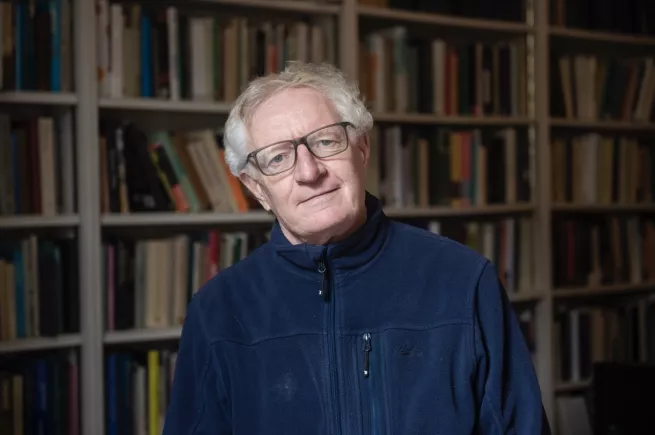My great-uncle never went to university: he had to leave school at 15 or so because he was the only one in his family organized enough to hold down a job. He became a successful businessman, but his deepest interest was in philosophy and psychology. He published serious articles and a book on philosophy, though without a high opinion of them. When I was very small, he discussed philosophical questions with me, not calling them that. As a teenager, I read some interviews with leading philosophers of the day. I felt at home with their elegantly abstract way of thinking, and even thought I could do it better. When I later discovered how hard it is, that just added to its interest.
1955 Born Uppsala, Sweden.
1972-73 Computer programmer, Atomic Energy Research Establishment, Harwell.
1973-76 Studied Mathematics and Philosophy, Balliol College, Oxford.
1976-80 Senior Scholar, Christ Church, Oxford; studied for DPhil on ‘The Concept of Approximation to the Truth’.
1980-88 Lecturer in Philosophy, Trinity College, Dublin.
1988-94 Fellow in Philosophy, University College, Oxford.
1995-2000 Professor of Logic and Metaphysics, University of Edinburgh.
2000- Wykeham Professor of Logic, University of Oxford, and Fellow of New College Oxford.
Visiting positions:
1990, 1995 Visiting Fellow, Australian National University.
1994 Visiting Professor, M.I.T.
1995 Visiting Erskine Fellow, University of Canterbury (New Zealand).
1998-99 Visiting Professor, Princeton University.
2003 Nelson Distinguished Professor, University of Michigan, Ann Arbor.
2004 Visiting scholar, Centre for Advanced Study, Norwegian Academy of Science and Letters.
2006 Townsend Visitor, University of California, Berkeley.
2006 José Gaos Professor, UNAM, Mexico, 2006.
2007 Tang Chun-I Visiting Professor, Chinese University of Hong Kong.
2013-15 Nelson Visitor, University of Michigan, Ann Arbor.
2016- Visiting professor, now Whitney Griswold Visiting Professor Yale University (5 weeks a year).
Distinctions and awards:
1997- Fellow of the British Academy.
1997- Fellow of the Royal Society of Edinburgh.
2004- Foreign member of the Norwegian Academy of Science and Letters.
2004-5 President of the Aristotelian Society.
2005-7 Vice-President then President of the Mind Association
2007- Foreign honorary member of the American Academy of Arts and Sciences.
2008-13 Vice-President of the British Logic Colloquium.
2009-12 Leverhulme Trust Major Research Fellowship
2013- Member of the Academia Europaea.
2014- Honorary Member of the Royal Irish Academy.
2014- Honorary Fellow, Balliol College, Oxford.
2014-18 Senior Adviser to the Chinese Society for Epistemology
2015 Doctor Honoris Causa, University of Bucharest.
2017- Member of the Institut International de Philosophie.
By far my greatest non-academic accomplishments are my three children Alice, Conrad, and Arno, though I can’t take credit for their accomplishments. My wife Ana Mladenović is a Serb; much of our family time is spent in Belgrade and on the Adriatic island of Korcula. I’m not an accomplished mountaineer, but when I can I like to go up not-too-hard mountains, like Gran Paradiso (Italy), Zuckerhütl (Austria), Toubkal (Morocco), Kosciusko (Australia), and lots in Scotland and Ireland. For an interview see http://www.whatisitliketobeaphilosopher.com/#/timothy-williamson/
I love doing philosophy in a place where it has been studied continuously for over six centuries; when I encounter a frustrating problem in my research, a turn around New College garden often gives me the solution.
Research interests
- Logic: modal logic (the logic of possibility and necessity); epistemic logic (the logic of knowledge); the logic of generalizations over absolutely everything, the nature of logical consequence; the methodology of theory choice in logic.
- Epistemology, the theory of knowledge: ‘unknown unknowns’, ‘known unknowns’, and ‘unknown knowns’; the nature of knowledge and justification.
- Metaphysics, as based on logic.
- Philosophy of language: the nature of vague language and of slurs.
- Metaphilosophy: the philosophical study of philosophy itself, its nature, methods, and aims.
Selected Major Publications
(for a fuller list see http://media.philosophy.ox.ac.uk/docs/people/williamson/CVshortnew.pdf)
Books
- Identity and Discrimination. Oxford: Basil Blackwell, 1990; 2nd ed. 2013.
- Vagueness. London and New York: Routledge, 1994.
- Knowledge and Its Limits. Oxford: Oxford University Press, 2000. Translated into Chinese.
- The Philosophy of Philosophy. Oxford: Blackwell, 2007. Translated into Spanish.
- Modal Logic as Metaphysics. Oxford: Oxford University Press, 2013.
- Tetralogue (I’m Right, You’re Wrong). Oxford: Oxford University Press, 2015. Translated into Korean, Chinese, German, Italian, Spanish, Turkish, Persian, Romanian.
- Doing Philosophy: From Common Curiosity to Logical Reasoning. Oxford: Oxford University Press, 2018.
- Suppose and Tell: The Semantics and Heuristics of Conditionals. Oxford: Oxford University Press, 2020.
- (with Paul Boghossian) Debating the A Priori. Oxford: Oxford University Press, 2020.
- P. Greenough and D. Pritchard, eds., Williamson on Knowledge, Oxford: Oxford University Press, 2009.
- M. McCullagh and J. Yli-Vakkuri, eds., Williamson on Modality, Canadian Journal of Philosophy, issues 4-5, vol. 46, and London: Routledge, 2017.
Selected articles
- ‘Moral anti-exceptionalism’, to appear in P. Bloomfield and D. Copp (eds.), The Oxford Handbook of Moral Realism, Oxford: Oxford University Press.
- ‘Knowledge, credence, and strength of belief’, to appear in A. Flowerree and B. Reed (eds.), Expansive Epistemology: Norms, Action, and the Social World, London: Routledge.
- ‘Edgington on possible knowledge of unknown truth’, to appear in J. Hawthorne and L. Walters (eds.), Conditionals, Probability, and Paradox: Themes from the Philosophy of Dorothy Edgington’, Oxford: Oxford University Press.
- ‘More Oxonian scepticism about the a priori’, to appear in D. Dodd and E. Zardini (eds.), The A Priori: Its Significance, Grounds, and Extent’, Oxford: Oxford University Press.
- (with Miroslava Trajkovski), ‘Abduction, perception, emotion, feeling: body maps and pattern recognition’, to appear in Philosophical Perspectives.
- ‘Justifications, excuses, and skeptical scenarios’, to appear in J. Dutant and F. Dorsch (eds.), The New Evil Demon, Oxford University Press.
- ‘The counterfactual-based approach to modal epistemology’, to appear in Otávio Bueno and Scott Shalkowski (eds.), Routledge Handbook of Modality, London: Routledge.
- ‘The KK principle and rotational symmetry’, Analytic Philosophy (online 2020).
- ‘Non-modal normativity and norms of belief’, Acta Philosophica Fennica, 96 (2020): 101-125 (volume on Normativity, ed. I. Niiniluoto and S. Pihlström).
- ‘Evidence of evidence in epistemic logic’, in M. Skipper and A. Steglich-Petersen (eds.), Higher-Order Evidence: New Essays. Oxford: Oxford University Press (2019), 265-297.
- ‘Morally loaded cases in philosophy’, Proceedings and Addresses of the American Philosophical Association, 93 (2019): 159-172.
- ‘Counterpossibles’, Topoi, 37 (2018): 357-368.
- ‘Gibbard on meaning and normativity’, Inquiry, 61 (2018), 731-741.
- ‘Hyman on knowledge and ability’, Philosophy and Phenomenological Research, 97 (2018): 243-248.
- ‘Supervaluationism and good reasoning’, Theoria, An International Journal for Theory, History, and Foundations of Science, 33 (2018): 521-537.
- ‘Alternative logics and applied mathematics’, Philosophical Issues, 28 (2018): 399-424, edited by Joshua Schechter.
- (with Jason Stanley), ‘Skill’, Noûs, 51, 4 (2017): 713-726.
- ‘Semantic paradoxes and abductive methodology’, in Bradley Armour-Garb (ed.), The Relevance of the Liar, Oxford: Oxford University Press, 2017. 325-346.
- ‘Acting on knowledge’, in J.A. Carter, E. Gordon, and B. Jarvis (eds.), Knowledge-First, Oxford: Oxford University Press, 2017. 163-181.
- ‘Model-building in philosophy’, in Russell Blackford and Damien Broderick (eds.), Philosophy’s Future: The Problem of Philosophical Progress. Oxford: Blackwell-Wiley, 2017: 159-173.
- ‘Dummett on the relation between logics and metalogics’, in Michael Frauchiger (ed.), Truth, Meaning, Justification, and Reality: Themes from Dummett (Lauener Library of Analytical Philosophy). Berlin: de Gruyter, 2017. 153-175.
- ‘Ambiguous rationality’, Episteme, 14, 3 (2017): 263-274.
- ‘Knowing and imagining’, in Amy Kind and Peter Kung (eds.), Knowledge through Imagination, Oxford: Oxford University Press, 2016, pp. 113-123.
- ‘Philosophical criticisms of experimental philosophy’, in Justin Sytsma and Wesley Buckwalter (eds.), A Companion to Experimental Philosophy, Oxford: Wiley Blackwell, 2016, pp. 22-36.
- ‘Absolute provability and safe knowledge of axioms’, in Leon Horsten and Philip Welch (eds.), Gödel’s Disjunction: The Scope and Limits of Mathematical Knowledge, Oxford: Oxford University Press, 2016, pp. 243-253.
- ‘Abductive philosophy’, Philosophical Forum, 47, 3-4 (2015): 263-280.
- ‘A note on Gettier cases in epistemic logic’, Philosophical Studies, 172 (2015): 129-140.
- ‘Knowing and believing, acting and intending’, Chinese Journal of Philosophy, 42, S1 (2015): 525-539.
- ‘Logic, metalogic, and neutrality’, Erkenntnis, 79, 2 (2014): 211-231.
- ‘Very improbable knowing’, Erkenntnis, 79, 5 (2014): 971-999.
- ‘How did we get here from there? The transformation of analytic philosophy’, Belgrade Philosophical Annual, 27 (2014): 7-37.
- ‘Gettier cases in epistemic logic’, Inquiry, 56, 1 (2013): 1-14.
- ‘How deep is the distinction between a priori and a posteriori knowledge?’, in A. Casullo and J. Thurow (eds.), The A Priori in Philosophy, Oxford: Oxford University Press, 2013: 291-312.
- ‘Philosophical expertise and the burden of proof’, Metaphilosophy, 42, 3 (2011): 215-29.
- ‘Necessitism, contingentism and plural quantification’, Mind, 119, 475 (2010): 657-748.
- ‘Reference, inference and the semantics of pejoratives’, in J. Almog and P. Leonardi, eds., The Philosophy of David Kaplan, Oxford: Oxford University Press, 2009: 137-158.
- ‘Conditionals and actuality’, Erkenntnis, 70, 2 (2009): 135-150.
- ‘Tennant’s troubles’, in J. Salerno, ed., New Essays on the Knowability Paradox, Oxford: Oxford University Press, 2009: 183-204 .
- ‘Probability and danger’ The Amherst Lecture in Philosophy 4 (2009): 1-35.
- ‘Why epistemology can’t be operationalized’, in Q. Smith, ed., Epistemology: New Essays, Oxford: Oxford University Press, 2008: 277-300.
- ‘On being justified in one’s head’, in M. Timmons, J. Greco and A. Mele, eds., Rationality and the Good: Critical Essays on the Ethics and Epistemology of Robert Audi, Oxford: Oxford University Press, 2007: 106-122.
- ‘Indicative versus subjunctive conditionals, congruential versus non-hyperintensional contexts’, in E. Sosa and E. Villanueva, eds., Philosophical Issues, Volume 16: Philosophy of Language, Oxford: Blackwell, 2006: 310-333.
- ‘“Conceptual truth”’. The Aristotelian Society, sup. vol. 80 (2006): 1-41.
- ‘Absolute identity and absolute generality’, in A. Rayo and G. Uzquiano, eds., Absolute Generality, Oxford: Oxford University Press, 2006: 369-389.
- ‘Stalnaker on the interaction of modality with quantification and identity’, in J. Thomson and A. Byrne, eds., Content and Modality: Themes from the Philosophy of Robert Stalnaker, New York: Oxford University Press, 2006: 123-147.
- (with Igor Douven), ‘Generalizing the Lottery Paradox’, British Journal for the Philosophy of Science, 57, 4 (2006): 755-779.
- ‘Can cognition be factorised into internal and external components?’, in R. Stainton, ed., Contemporary Debates in Cognitive Science, Oxford: Blackwell, 2006: 291-306.
- ‘Armchair philosophy, metaphysical modality and counterfactual thinking’, Proceedings of the Aristotelian Society 105, 1 (2005): 1-23.
- (with Michael Fara), ‘Counterparts and actuality’, Mind 114, 453 (2005): 1-30.
- ‘Contextualism, subject-sensitive invariantism, and knowledge of knowledge’, Philosophical Quarterly 55, 219 (2005): 213-235.
- ‘Knowledge, context and the agent’s point of view’, in G. Preyer and G. Peter (eds.), Contextualism in Philosophy: Knowledge, Meaning, and Truth, Oxford: Clarendon Press 2005: 91-114.
- (with Claudio Pizzi), ‘Conditional excluded middle in systems of consequential implication’, Journal of Philosophical Logic, 34, 4 (2005): 333-362.
- ‘Knowledge and scepticism’, in F. Jackson and M. Smith, eds., The Oxford Handbook of Contemporary Philosophy, Oxford: Oxford University Press, 2005: 681-700.
- ‘Philosophical “intuitions” and scepticism about judgement’, Dialectica 58, 1 (2004): 109-153.
- ‘Past the linguistic turn?’, in B. Leiter, ed., The Future for Philosophy, Oxford: Oxford University Press, 2004: 106-128.
- ‘Some computational constraints in epistemic logic’, in D. Gabbay, S. Rahman, J. M. Torres and J. P. van Bendegem, eds., Logic, Epistemology and the Unity of Science (Cognitive Science Series), Oxford and Paris: Hermes, 2004: 437-456.
- ‘Everything’, Philosophical Perspectives 17, 1 (2003): 415-465.
- ‘Understanding and inference’, The Aristotelian Society, sup. vol. 77 (2003): 249-293.
- ‘Vagueness in reality’, in M. Loux and D. Zimmerman, eds., The Oxford Handbook of Metaphysics, Oxford: Oxford University Press, 2003: 690-715.
- (with Agustín Rayo), ‘A completeness theorem for unrestricted first-order languages’, in J. C. Beall, ed., Liars and Heaps: New Essays on Paradox, Oxford: Clarendon Press, 2003: 331-356.
- ‘Necessary existents’, in A. O’Hear, ed., Logic, Thought and Language (Royal Institute of Philosophy Supplement: 51), Cambridge: Cambridge University Press, 2002: 233-251.
- ‘Vagueness, identity, and Leibniz’s Law’, in A. Bottani, M. Carrara and P. Giaretta, eds.,Individuals, Essence and Identity: Themes of Analytic Metaphysics (Topoi Library, vol. 4), Dordrecht: Kluwer, 2002: 273-303.
- (with Jason Stanley), ‘Knowing how’, The Journal of Philosophy 98, 8 (2001): 411-444.
- ‘Vagueness, indeterminacy and social meaning’, in C. Grant and D. McLaughlin, eds., Language-Meaning-Social Construction: Interdisciplinary Studies (Critical Studies, vol. 16), Amsterdam: Rodopi, 2001: 61-76.
- (with Miroslava Andjelković), ‘Truth, falsity and borderline cases’, Philosophical Topics 28, 1 (2000): 211-244.
- ‘Scepticism and evidence’, Philosophy and Phenomenological Research 60, 3 (2000): 613-628.
- ‘Tennant on knowable truth’, Ratio 13, 2 (2000): 99-114.
- ‘On the structure of higher-order vagueness’, Mind 108, 429 (1999): 127-143.
- ‘Existence and contingency’, Aristotelian Society, sup. vol. 73 (1999): 181-203.
- ‘Truthmakers and the converse Barcan formula’, Dialectica 53, 3/4 (1999): 253-270.
- (with Nicolao Bonini, Dan Osherson and Riccardo Viale), ‘On the psychology of vague predicates’, Mind and Language 14, 4 (1999): 377-393.
- ‘Bare possibilia’, Erkenntnis 48, 2&3 (1998): 257-273.
- ‘Conditionalizing on knowledge’, The British Journal for the Philosophy of Science 49, 1 (1998): 89-121.
- ‘Iterated operators’, in T.J. Smiley, ed., Philosophical Logic, Oxford: Oxford University Press, 1998, Proceedings of the British Academy 95 (1998): 85-133.
- ‘Indefinite extensibility’, in J. Brandl and P. Sullivan, eds., New Essays on the Philosophy of Michael Dummett, Amsterdam and Atlanta GA Rodopi, 1999: 1-24.
- ‘The broadness of the mental: some logical considerations’, Philosophical Perspectives 12 (1998): 389-410.
- ‘Knowledge as evidence’, Mind 106, 424 (1997): 717-741.
- (with Lloyd Humberstone) ‘Inverses for normal modal operators’, Studia Logica 59, 1 (1997): 33-64.
- (with Claudio Pizzi), ‘Strong Boethius’ Thesis and consequential implication’, Journal of Philosophical Logic 26, 5 (1997): 569-588.
- ‘Imagination, stipulation and vagueness’, in E. Villanueva, ed., Philosophical Issues 8: Truth, Atascadero, CA: Ridgeview, 1997: 215-228.
- ‘Knowing and asserting’, The Philosophical Review 105, 4 (1996): 489-523.
- ‘Cognitive homelessness’, The Journal of Philosophy 93, 11 (1996): 554-573.
- (with Hyun Song Shin) ‘How much common belief is necessary for a convention?’, Games and Economic Behavior 13 (1996): 252-268.
- ‘The necessity and determinacy of distinctness’, in S. Lovibond and S. Williams, eds., Essays for David Wiggins: Identity, Truth and Value, Oxford: Blackwell, 1996: 1-17.
- ‘What makes it a heap?’, Erkenntnis 44, 3 (1996): 327-339.
- ‘Is knowing a state of mind?’, Mind 104, 415 (1995): 533-565.
- ‘Definiteness and knowability’, Southern Journal of Philosophy 33 (1995, Spindel Conference supplement): 171-191.
- ‘Non-genuine MacIntosh logics’, Journal of Philosophical Logic 23, 1 (1994): 87-101.
- (with Hyun Song Shin) ‘Representing the knowledge of Turing machines’, Theory and Decision 37 (1994): 125-146.
- ‘Never say never’, Topoi 13, 2 (1994): 135-145.
- ‘Some admissible rules in non-normal modal systems’, Notre Dame Journal of Formal Logic 34, 3, (1993): 378-400.
- ‘On intuitionistic modal epistemic logic’ Journal of Philosophical Logic 21, 1 (1992): 63-89.
- ‘An alternative rule of disjunction in modal logic’, Notre Dame Journal of Formal Logic 33, 1 (1992): 89-100.
- ‘Inexact knowledge’, Mind 101, 402 (1992): 217-42.
- ‘Vagueness and ignorance’, Aristotelian Society, sup. 66 (1992): 145-162.
- ‘Two incomplete anti-realist modal epistemic logics’, The Journal of Symbolic Logic 55, 1 (1990): 297-314.
- ‘First order logics for comparative similarity’, Notre Dame Journal of Formal Logic 29, 4 (1988): 457-481.
- ‘Assertion, denial and some cancellation rules in modal logic’, Journal of Philosophical Logic 17, 3 (1988): 299-318.
- ‘Equivocation and existence’, Proceedings of the Aristotelian Society 88 (1987/8): 109-127.
- ‘Knowability and constructivism’, The Philosophical Quarterly 38, 153 (1988): 422-432.
- ‘Bivalence and subjunctive conditionals’, Synthese 75, 3 (1988): 405-421.
- ‘Invertible definitions’, Notre Dame Journal of Formal Logic 28, 2 (1987): 244-258.
- ‘Anthropocentrism and truth’, Philosophia 17, 1 (1987): 33-53.
- ‘Criteria of identity and the Axiom of Choice’, The Journal of Philosophy 83, 7 (1986): 380-394.
- ‘Converse relations’, The Philosophical Review 94, 2 (1985): 249-262.
- ‘The infinite commitment of finite minds’, Canadian Journal of Philosophy 14, 2 (1984): 235-255.

Read more about our tutorial system and what it offers all of our students.
Discover more about New College
Find out more about what it is like studying at one of the largest but friendliest Colleges in Oxford.



